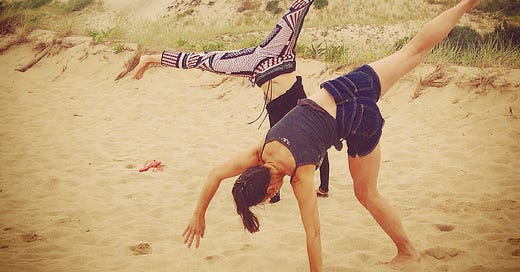She wanted to be a magazine writer and a novelist. We said we’d co-author a book some day. We liked how our last names sounded together. We’re so complementary, we said.
A NAME I WOULD KNOW BY SUSANNA SPACE 34THPARALLEL MAGAZINE ISSUE 48
A thin paperback in Borders, the glossy cover, her name in shimmering type. I reach over my son curled in the stroller, his breath heavy with sleep. Sit on the floor and flip through the pages. Run a finger over the grainy photograph, blond wisps framing her face.
She approached me after the first publishing class. “Holly,” she said, holding out her hand. Her nails painted a glossy beige. Crisp white shirt, dewy skin, bracelets jingling on slender wrists. “I’m in law too,” she said with a wide smile, sticking her finger in her mouth in a mock forced vomit. I mock-sneered back. Laughter.
As we talked, her words bubbled with a sharp wit that belied her soft brown eyes, eyes a half-size too large for her other, more delicate features. She touched my wrist, laughed at something I said. Her loose, easy way, her forthrightness, the sparkle of blush on her cheeks, her laugh, deep and full, it all captivated me.
I learned later it was my necklace that drew her to me. Tiny beads in a double loop set against white cotton. My style, as she would name it.
I signed the lease on a rent-controlled apartment in Boston with a stained clawfoot tub and bars on the windows. I waitressed. I temped. I found an internship in the editorial department of a little arts magazine, the kind that’s printed on newsprint and given away free.
Princess Diana was killed in a car crash, the X Files won an Emmy, and I enrolled in a postgraduate course that, the brochure said, prepared young professionals for a career in publishing. An English major, I fantasized about being a book editor, a stack of manuscripts on my desk. I dreamt too of being an author, my name centered on a crisp white title page. The nine-month program would be brief and practical. I would learn everything about magazines, newspapers and books from instructors working in the field. The campus was downtown. I was excited. I was ready.
I had landed my first real job working as a legal assistant for an attorney. A well-dressed Harvard grad, Philip had a thick-mustached, young-Einstein face. He was nice enough, and, though his cases were mostly injuries and accidents—explosions from gas leaks, chemical exposure injuries, wrongful death suits—the office was downtown in a fun, touristy part of the city. I was finally earning a salary, with paid vacation days and health insurance. Plus, Philip liked to write, so he liked that I liked to write, too.
Holly was an attorney with one of the prestigious firms whose embossed stationery occasionally landed on my desk. When I told her about my little office, my meager paychecks, she rolled her eyes. “I could get you a paralegal job that pays 60K,” she snapped her fingers, “like that.”
Holly had found The One: a lawyer she’d met during a summer internship. She described seducing him with heels and low-cut blouses. Rather than a wedding she referred to her Elopement, a word that in her mouth sounded impossibly sophisticated as if spritzed with expensive perfume. In those early conversations outside our new school she spoke of Eric’s intelligence, his many accomplishments.
At work I drafted letters, edited briefs, reviewed depositions. I went along to court appearances, where Philip and I waited in cold, dingy courtrooms for our cases to be called. I thought he was funny, always talking about how old he was (he was in his 40s, I guessed) how his youth had passed him by.
He thought I did good work and told me so. He would shake his head and tell me I should go to law school. I could get into Harvard, he said.
I didn’t want to be a lawyer but I was flattered that he thought I could be one. And getting into Harvard? Though I didn’t believe him about that, I wanted to.






